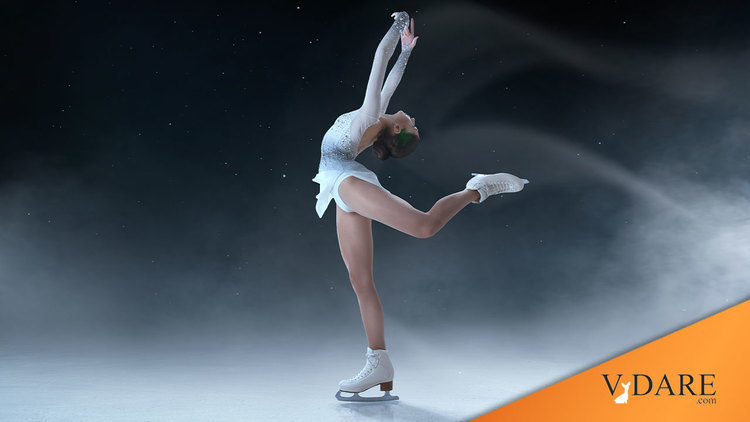
08/02/2012
Back in 2005, Michael Blowhard offered the best explanation I've heard in response to the perpetual heterosexual male question about why fashion models look like fashion models (i.e., tall, bony) rather than like strippers. All those 5'10" 120 pound Slovakians in the ads in women’s magazines appeal to female readers' fantasies about being more gravity resistant, about being less weighted down by mortal flesh:
My own modest theory is that fashion magazines are to women what magazines about computers (and porno) are to guys — they're fantasy books. It’s just that women’s fantasies — many women’s fantasies, anyway — concern being photographed (ie., desired) and looking glamorous (ie., desirable). Where guys seem to enjoy imagining what they'd do to and with what’s in the picture, women seem prone to imagine being what’s pictured.There’s an additional fantasy element too, which is autonomy. Part of what women fashion-magazine fans seem to enjoy imagining is the fantasy of being found glamorous purely for its own sake. They seem to want to forget about the pleasing-guys element. There’s a little defiance in the fantasy — and you can see the defiance in many of the kicky poses and attitudes the models strike.
Perhaps something that helps explain the appeal of these images is that not only do many women enjoy imagining looking like these models, they enjoy imagining feeling like them too. I think guys often forget what a weighty and earthbound thing it can be, being a gal. There’s so much dreariness to contend with: fatbags, hormones, moods, emotional agonies, etc. Women are weighed down by a lot of burdens, or at least they feel that they are, which is good enough for the purposes of my attempt at an explanation here.
The gals in the pages of fashion magazines and catalogs aren’t weighed down by anything, not even flesh. They burst out of cabs, they leap onto sidewalks, they let loose with irrepressible guffaws, they're caught by insistent cameras looking their klutzy-but-charming best; they're tall and slim, and they're feelin' good and they're lookin' ready to dazzle. The girls in the pix get to enjoy the champagne-and-cocaine fun parts of being a grownup woman. They aren’t saddled with fat asses and wobbly upper arms, with PMS, with no-good boyfriends and lecherous bosses, with imperfect features, with senseless mood swings, etc.
What the fashion mags are selling is, to some extent, a fantasy of play and freedom.
Which, come to think of it, is (in a general sense) pretty much what men’s magazines sell too. Many guys enjoy indulging in fantasies about utopia — a male utopia full of gadgets and sex-without-consequences. Many gals love indulging in fantasies about utopia too — a female utopia, where the fantasizer is carefree and irresistably desirable 24/7.
My hunch: perhaps superslim-and-supertall are a visual representation of carefree-and-desirable.
By the way, that suggests an insight into why fashion models almost always say in interviews that they were tomboys who weren’t interested in clothes and makeup when they were young. It’s because it’s sort of true. Females tend to stop growing in height at puberty, so very tall women tend to be the ones who reached puberty later, and thus kept growing for an extra year or two in adolescence, which is the time period they remember.
Gymnastics in the Olympics offers its huge number of female viewers a similar fantasy of weightlessness, but in a more presexual version of Twirling Tweens. It’s a contest to identify the World’s Best Pixie, just as the Winter Olympics figure skating finds the World’s Best Princess.
Indeed, the Olympics had to impose a minimum age limit of 16 to keep the event from being dominated by little girls (Nadia Comaneci, for instance, was 14 in 1976 when she won all those gold medals). Not surprisingly, most of the winning American team this year is 16. Adult women are built more for comfort than speed.
Gymnastics currently seems to select for girls who, like fashion models, go through puberty late, but who, unlike models, stay short.
This is a content archive of VDARE.com, which Letitia James forced off of the Internet using lawfare.